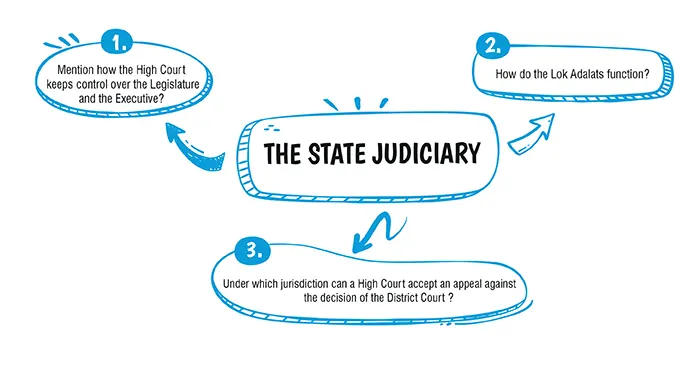Home / Board / ICSE / important Questions / Class 10 / History & Civics / The State Judiciary
Table of Contents

Ans.(c) Both (a) and (b)
Explanation:
The Sessions Judge hears appeals against the judgement of the Chief Judicial Magistrate or the Chief Metropolitan Magistrate.All persons convicted by the Sessions Court can appeal to the High Court.
Ans.(d) All of the above
Explanation:
These courts were set up on the recommendation of Justice Bhagwati to encourage the settlement of disputes speedily and through compromises between the parties.Lok Adalats are presided over by judicial officers and other persons who possess such qualifications as may be prescribed by the state.On October 6, 1985, for the first time, Lok Adalats were held in Delhi.Justice P.N. Bhagwat inaugurated the Adalats.
Explanation:
Like the Supreme Court, a High Court also acts as a Guardian of the Constitution. If it finds any law, executive order or any ordinance to be inconsistent with the provisions of the Constitution, it can declare it null and void. Thus, it controls both the Legislature and the Executive.
Explanation:
Functioning of Lok Adalats : Lok Adalats are presided over by judicial officers and other persons, who possess such qualifications as may be prescribed by the State. They make an endeavour to bring compromise or agreement between the parties. On October 6, 1985 for the first time the Lok Adalats were held in Delhi. Justice P. N. Bhagwati inaugurated the Adalats. On the first day, five Lok Adalats were held. On this day, 116 persons received compensation to the tune of ₹35 lakhs. These people had been contesting their motor accident claims since 1978-79. Delhi Transport Corporation immediately made payment to the aggrieved parties. The Legal Services Authorities Act, 1987 provides that State or district authorities will organise Lok Adalats from time to time. All decisions of the Lok Adalats are now deemed to be decrees of a Civil Court and shall be binding on the parties to the dispute. Up to December 31, 1997 more than seventeen thousand Lok Adalats had been held in different parts of the country. They heard and settled about 68.86 lakh cases. In more than three lakh motor vehicles accident cases, compensation amounting to more than a thousand crore of rupees was awarded.
Explanation:
Under Appellate Jurisdiction (both civil and criminal), the High Court can accept an appeal against the decisions of the lower courts. In civil cases, the High Court hears the appeal against the decisions of District Judges. In Criminal cases, Appellate Jurisdiction consists of appeals :
(i) Against the judgement of a Sessions Judge or an Additional Sessions Judge, where the sentence of imprisonment exceeds seven years.
(ii) Against the judgments of Assistant Sessions Judge, the Chief Metropolitan Magistrate or other Judicial Magistrates, where the sentence of imprisonment exceeds four years.
Also, the High Courts have the following powers with respect to appeals : (a) A sentence of death must be confirmed by the High Court before it can be carried out; and (b) Appeals by the State also lie to the High Court, when the order of acquittal is passed by a Sessions Judge.
Download Mind Map of this chapter
Download NowWant to Practice Mock Tests of this chapter
Practice NowDownload Important Questions of this chapter
Download NowCBSE Important Questions Class 10
ICSE Important Questions Class 10
CBSE Important Questions Class 10
ICSE Important Questions Class 10